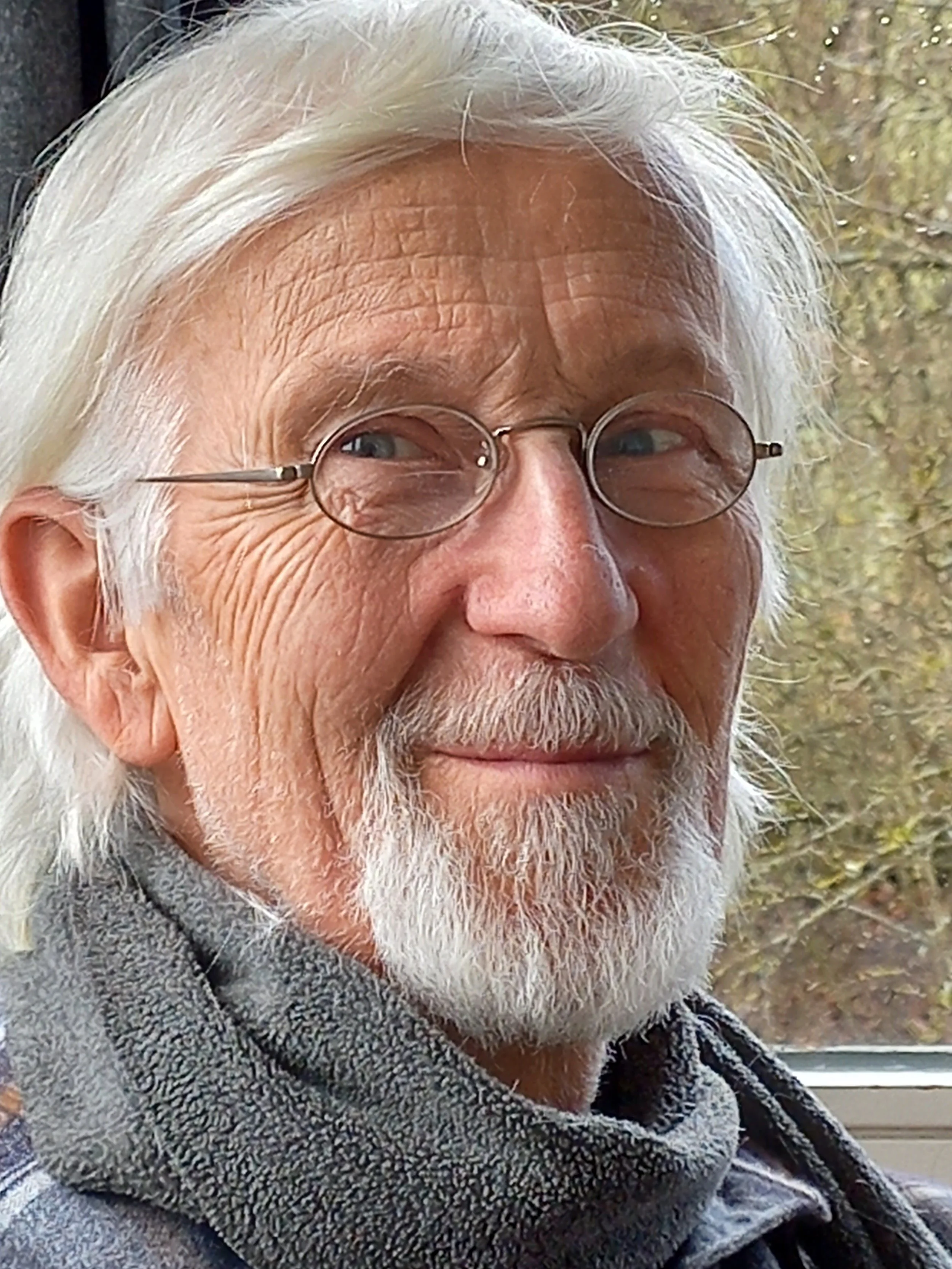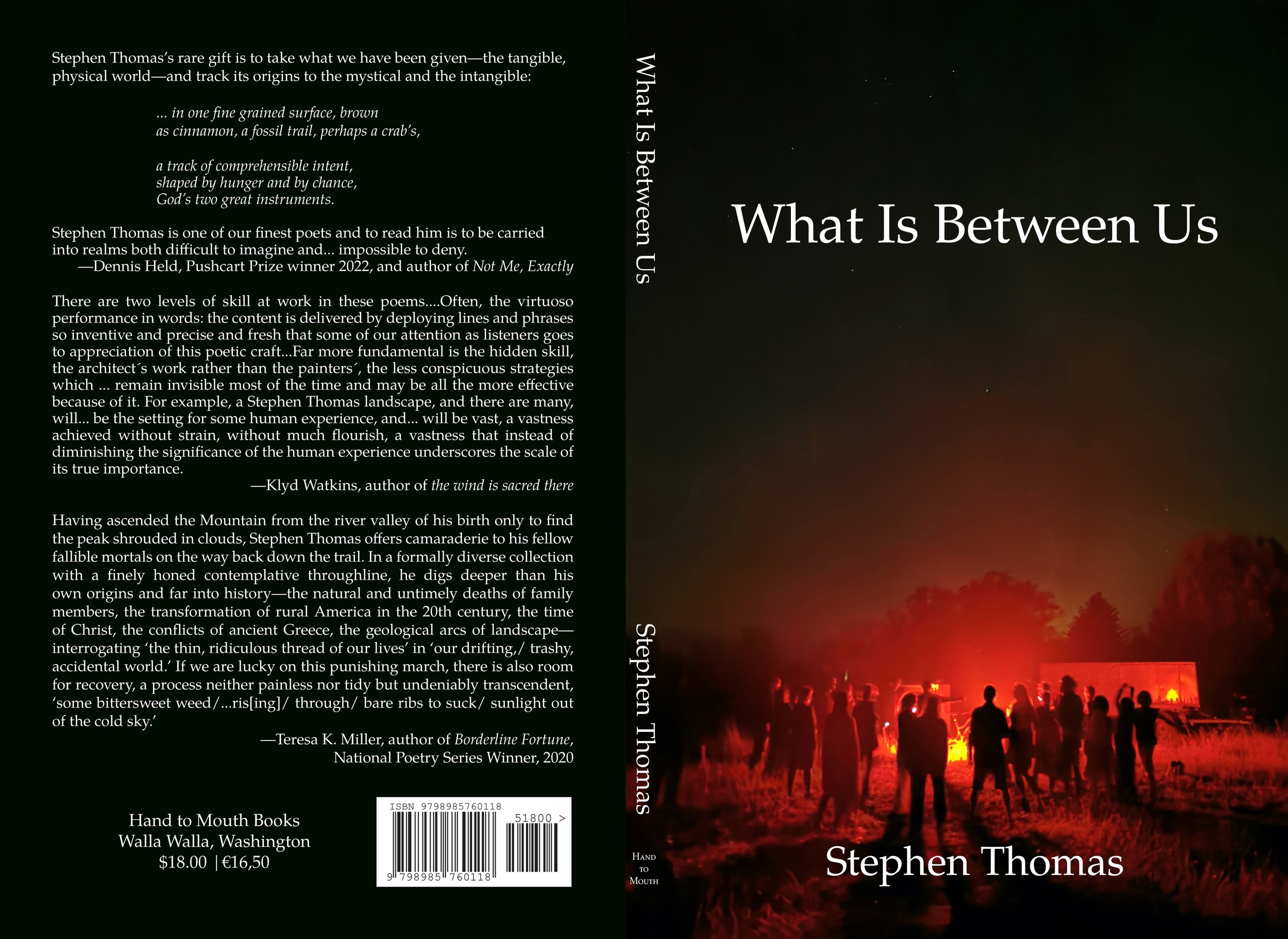Raven Interviews Stephen Thomas, poet, teacher, mentor.
On Saturday, July 1, 2023, poet Stephen Thomas will lead a free public workshop, at BookTree Bookstore in Kirkland: “The Persistent Line.” AND He will read from his recent book of poems, What Is Between Us, from Hand to Mouth Books out of Walla Walla, Washington (2023).
Raven Chronicles: First a bit of history to introduce Stephen Thomas, poet, teacher, and mentor.
Stephen Thomas played his role in Seattle’s poetry scene of the 80s, 90s and early 2000s. He performed often at Red Sky Poetry Theater, at Bumbershoot, and many other regional venues, as well as farther afield. In 1984, he founded and built The Cabaret Hegel, where now an off-ramp leads I-5 traffic into the Industrial Flats. There, Stephen presented and performed with many other Northwest writers and musicians, including Jesse Bernstein. Stephen taught creative writing (poems) at the University of Washington Extension. He has published his work in many ephemeral magazines, as well as in Exquisite Corpse, Poetry Northwest, Raven Chronicles, The Malahat Review, Windfall, Malpais Review, and others. His book, Journeyman, was published by Charles Potts’ Tsunami Inc, 26 years ago. He currently lives in Germany, where he helped found Gemeinschaft Sonnenwald: a sustainable, regenerative, agriculture community.
Raven: Could you tell us a little about your history/wanderings after you left the US and up until you ended up in Germany?
Stephen Thomas: I think I was 54 when Wanderlust got ahold of me. I went first to Bohemia, where a romance ensnared me for a couple of years and then found a teaching job in Germany, where I met my wife at a tai chi studio. Together we began to look for an alternative to city life and met up with a group of aging leftists who were on the hunt for a farm. In 2015, we found a farm in a tiny Black Forest village (Schernbach, population 50). In 2016, several of us moved to the village and began negotiating with the then owners, a foundation that for 160 years had cared for developmentally disabled folks on the land. In 2019, when the foundation moved its charges into new quarters in neighboring towns, we signed a mortgage, moved in, and began the challenging work of learning: how to run a farm and how to live up to a vision of a sustainable, self-sufficient future. There were about 16 of us then and now we are 60 adults, 18 children, 55 head of cattle, two pigs, 67 chickens, several cats and a few beehives.
Raven: What inspired you to write this book, these particular poems? And how did you arrive at the title, What Is Between Us?
Stephen: Some of these poems are so old I don’t remember writing them. Still, I can see their worth. I assembled them all, old and new, because Charles Potts, who published my last book Journeyman, offered to publish another collection in honor of my coming back to the States for a while. As I assembled them, I discovered that I have a few themes. The book is arranged in five sections, each comprised of poems that explore different concerns: the natural world, becoming American, grief at loss, alcoholism and recovery, the spiritual life. (About becoming more American: the longer I live in Europe the more American my poems become.) These things have concerned me all through my life. When my sister was killed along with her husband by a drunk driver in 1997, I did what a poet does: try to find the words and rhythms that fit the awakened feelings. It was in this context that the ambiguous phrase what is between us came to me. It can, of course, refer to what separates us and what joins us. It could be a question or an incomplete statement. It points to the tension on earth right now as the fabric of life is threatened by our inability to face what it means to be mortal and everlasting.
Raven: What is your writing process? (Where, when, and how often do you write?)
Stephen: The process varies like the weather. I keep notebooks. I write most every day. Things come to me, phrases, sentences, notions, feels or fields of linguistic energy. I write them down as best I can. Occasionally, one takes ahold of me, like the wanderlust that got me here, and I write. After writing comes revision, which goes on until the poem finds its way into print.
Raven: who are some of your favorite poets, ones you go to again and again?
Stephen: A.R. Ammons: his Collected Poems, 1951–1971. I’ve had four copies of this book. Robert Bringhurst: The Beauty of the Weapons. I’ve had at least two copies of this. It astounds me every time. Emily Dickinson. Enough said. Shakespeare. I read all the plays last year. Hopkins. Blake. Glück. Homer. McHugh. Roethke. Wright, James . Whitman. Williams. Hölderlin. Heidegger and Dante.
Raven: What are you reading right now?
Stephen: The book I open most often is Aldous Huxley’s The Perennial Philosophy. Dickinson, a poem or two a day, just to chew on. Keats! I’ve started reading the long poems, which are charged with beauty and repressed sexuality. Heidegger. Among philosophers, he is foremost in the appreciation of poem and poets. It was he who introduced me to Hölderlin, whose Friedensfeier provided me with my epigraph. Joanna Macy! She has displaced Spinoza in my pantheon of Philosophers. Her World as Lover, World as Self is for me the most important philosophical work of the the 20th century
Raven: What’s the best piece of writing advice you’ve ever received?
Stephen: Write every day.
Raven: If you have any advice for beginning poets, what is it?
Stephen: Read poems. Read them aloud. Imitate the ones you admire until your work begins to sound like them, then struggle against their influence.

